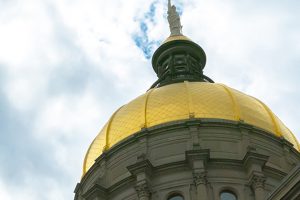People-Powered Prosperity
People-Powered Prosperity
It is clearer than ever before that our state’s economy is not inclusive of every Georgian–and our entire state suffers as a result. People-Powered Prosperity details a vision for how state lawmakers can pursue strategies to help Georgians recover and thrive, as well as how the state can responsibly pay for the services our families rely on.
Our state boasts a successful business community and an attractive place to work, but problems and barriers across Georgia persist, including poverty, sky-high costs for college and child care, the maternal mortality crisis and inequities among women and people of color. These problems existed before COVID-19, but the pandemic has underscored them. Recovery is only possible if we invest in every Georgian and ensure no one is left out.
This campaign, led by GBPI, 9to5 Georgia, Faith in Public Life and Small Business Majority, offers policy solutions to these issues and explains how Georgia can fund statewide prosperity. During the 2023 Legislative Session, several PPP priorities advanced through the Legislature, and though this campaign will end in 2023, the work towards advancing a proactive revenue agenda and policies that strengthen economic security for Georgians continues.
Read our latest progress report here.

Sign Our Petition
and show your support for implementing a people-first plan for Georgia

Request a Speaker
to come present the People-Powered Prosperity vision to your community
The Roadmap to People-Powered Prosperity Runs Through Four Key Pillars

Thriving Families

Healthy Communities

Educated Youth

A Strong Workforce
Georgia Can Afford an Ambitious Investment in its People
Fully funding our state’s shared priorities requires balancing Georgia’s state budget with sustainable revenue sources that fairly tax residents across the state. It is also important to reverse tax policies that cause the lowest-income families to pay the highest percentage of their earnings in state and local taxes and to make certain that the state avoids costly and inefficient loopholes or unnecessary tax breaks.
By modernizing the state’s tax code and implementing common-sense policies with demonstrated success in other states across the nation, Georgia’s leaders can both increase the state’s ability to fund its priorities and more equitably tax households. In order to achieve this goal, state leaders can:
- Preserve and strengthen the income tax for households and corporations by defending against cuts that largely benefit top earners and scaling back the double deduction to stabilize revenues and recover quickly during times of economic downtown
- Evaluate tax breaks for big business in order to trim back those that do not deliver enough benefit to offset the state’s lost revenue
- Increase the cigarette tax to the national average in order to raise over $500 million in annual revenues while discouraging tobacco use
- Extend the sales tax to cover all online purchases and some services
Recent Work
The Impact of Racism on Georgia’s Safety Net
Furaha Njoroge
August 7, 2020
CW: To highlight the problematic narratives surrounding safety net programs, this piece quotes racist statements opponents of these ...
Spread the Word: COVID Relief Plan Must Meet the Need of Georgians
Jennifer Crane
July 28, 2020
Millions of people are struggling to feed themselves and their families, falling behind on rent and losing their ...
GBPI Writes Senator Perdue About the HEROES Act
Taifa Smith Butler
July 27, 2020
GBPI recently wrote the following letter to Senators Perdue and Loeffler asking them to support the HEROES act ...
GBPI Submits Public Comment on New 1332 Waiver Application
Laura Harker
July 24, 2020
July 23, 2020 Ryan Loke c/o The Office of the Governor 206 Washington Street Suite 115, State Capitol ...
Adding Up the Fiscal Notes: Sine Die 2020
Daniel Kanso, PhD
July 16, 2020
Each year, the Georgia Budget and Policy Institute analyzes tax legislation passed by the General Assembly ...
Sine Die 2020: More Work Needed to Address Georgia’s Revenue Crisis
Caitlin Highland
June 29, 2020
After a three-month hiatus due to COVID-19, the 2020 legislative session ended Friday, June 26. When lawmakers returned in mid-June, the world had shifted. A ...






